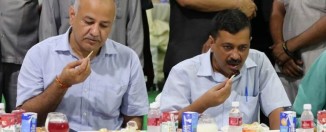Home Latest News AAP Latest High Court asks Arvind Kejriwal to justify stadium session for anti-graft Jan...
High Court asks Arvind Kejriwal to justify stadium session for anti-graft Jan Lokpal Bill
On Sunday, Delhi Chief Minister Arvind Kejriwal says he will present his anti-graft Jan Lokpal Bill to lawmakers for their review – not at the state legislature, but at a city stadium, with the public in attendance.The city police had asked him to reconsider the venue for security reasons. Delhi’s Lieutenant Governor Najeeb Jung had also implied that “the sanctity” of the legislative process could be undermined by the public session. Mr Kejriwal dismissed both concerns. Today, the Delhi High Court has asked his government to explain why the stadium gathering is justifiable.





Needed – some Simple Answers !
This is with reference to the controversy surrounding the pricing of KG-6 gas of Reliance , which started with $ 2.4 , is currently $ 4.2 and slated to rise to $ 8.4 / unit , from April 2014
Writing in yesterday’s Times of India , ( Swaminomics ) , eminent economist , Swaminathan Anklesaria Aiyar , made following points :
> Reliance ( KG – 6 ) accounts for only 10 % of the gas production in our
country . Balance 90 % is by Public Sector Companies such as ONGC etc
> Hence , any increase in selling price will mostly benefit government itself
( Any idea , what will government do with this windfall ? )
> Price – hike envisaged is recommended by a committee headed by Mr C
Rangrajan ( – implying , infallible / sacrosanct ? )
> By introducing price control on gas , ” India’s name is mud globally , and
top exploration companies now avoid India ”
> An economic rule of thumb is that ” traded Commodities ” should be
priced on par with the import price ( my question : irrespective of the
actual cost of production in India ? )
The Rangrajan price of $ 8 / unit , is well below the import price
Not being an economist , I am confused !
May be Mr Aiyar can dispel my following doubts :
# By taking out of our own soil ( or sea ) , does gas become a ” traded
commodity ” ? – even if entirely sold in India ?
# Is KG-6 gas a ” Natural Resource ” which belongs to the Nation – and
not to Reliance ?
# Is Reliance the ” Owner ” of the gas or a mere ” Contractor ” ?
# Would Mr Aiyar , want the Central Government to extend the same logic
to other ” Natural Resources ” ( belonging to the country ) , being dug
out from the earth ( by private companies ) , such as :
* Oil / Coal / Shale Gas etc ( Fossil Fuels )
* Ores of Iron / Copper / Zinc / Aluminum etc
* Trees ( timber ) that grow in our jungles
* Any number of minor minerals / chemicals
Should these too , be treated as ” Traded Commodities ” , whose local
selling prices must be same as Imported prices ?
# What about the air / wind that blows freely over our land ?
Does it belong to the Nation or not ?
Or , does it belong to the Companies setting up WIND FARMS , to
generate electricity ?
Should such power be ” Price Controlled ” or not ?
# What about the Sunlight that falls on our vast land ?
Who does it belong to ? To our government or to the companies setting
up mega Solar Power Projects ?
Should there be a price control on such power – produced , using a National Resource ?
# What about the hydro – power generated by private sector companies
from the water flowing in our Country’s rivers ?
Does – or does not – that water belong to the Nation ?
Should not such power be price – controlled ?
# Tomorrow , if a private sector company ( or a consortium of Indian
Companies , in joint venture with foreign companies ) , invest Rs 1 Lakh
Crores , to build the 22 Km long Kalpsar Dam across the Bay of Cambay
in Gujarat , and generate 10,000 MW of power from Oceanic Tides , –
can they be allowed to set any selling price ? At International price ?
I suppose , it would be next to impossible for them to ” Export ” such
power beyond the shores of India !
# Incidentally , what about the Airwaves ( the 2G / 3G Spectrum ) ?
Is that also a Natural Resource which belongs to the Nation ?
Having ” licensed ” it from the Central Government , can Mobile
Phone companies , set any selling prices for their services ?
Even with a combined debt of around Rs 2 Lakh Crores , how are these
Mobile companies , able to deliver ( nearly ? ) cheapest mobile phone
services in the entire World ? May be at 10 % of international price ?
# In ALL of the above – mentioned cases , should Central Government
carefully calculate / frequently audit , the ” Cost of Production ” ? Then
link the ” Local / Domestic , Selling Prices ” to such ” Cost of Production ”
allowing certain pre-determined ” Return on Investment ” ?
# Even as we agree that ” Export prices ” of gas are governed by prevailing
international prices , how come the ” Domestic Prices ” of gas are vastly
different in different countries , ranging from under $ 1 to $ 5 / unit ?
Does this itself , not prove that , in each country , domestic prices are
linked to their own local ” Cost of Production ” ?
# Very often , have we not exported , food grains , at ” Below the Cost ” ?
Mr AIYAR ,
You will be doing a great service to millions of ignoramus like me , by offering your own ” Views ” on the points raised above
And , I suppose , since the fall in production from KG – 6 , is purely and entirely , due to ” Technically Sound ” reasons , raising of the selling price to
$ 8 ( or even $ 16 / – ! ) , won’t result in any increase in production !
Time alone will tell !
* hemen parekh ( 17 Feb 2014 / Mumbai )